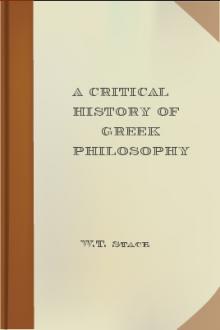Hegel's Philosophy of Mind by Georg Wilhelm Friedrich Hegel (novels to improve english .TXT) 📕

- Author: Georg Wilhelm Friedrich Hegel
- Performer: -
Book online «Hegel's Philosophy of Mind by Georg Wilhelm Friedrich Hegel (novels to improve english .TXT) 📕». Author Georg Wilhelm Friedrich Hegel
§ 471. The autonomy of the practical mind at first is immediate and therefore formal, i.e. it finds itself as an individuality determined in its inward nature. It is thus “practical feeling,” or instinct of action. In this phase, as it is at bottom a subjectivity simply identical with reason, it has no doubt a rational content, but a content which as it stands is individual, and for that reason also natural, contingent and subjective,—a content which may be determined quite as much by mere personalities of want and opinion, &c., and by the subjectivity which selfishly sets itself against the universal, as it may be virtually in conformity with reason.
An appeal is sometimes made to the sense (feeling) of right and morality, as well as of religion, which man is alleged to possess,—to his benevolent dispositions,—and even to his heart generally,—i.e. to the subject so far as the various practical feelings are in it all combined. So far as this appeal implies (1) that these ideas are immanent in his own self, and (2) that when feeling is opposed to the logical understanding, it, and not the partial abstractions of the latter, may be the totality—the appeal has a legitimate meaning. But on the other hand feeling too may be onesided, unessential and bad. The rational, which exists in the shape of rationality when it is apprehended by thought, is the same content [pg 093] as the good practical feeling has, but presented in its universality and necessity, in its objectivity and truth.
Thus it is on the one hand silly to suppose that in the passage from feeling to law and duty there is any loss of import and excellence; it is this passage which lets feeling first reach its truth. It is equally silly to consider intellect as superfluous or even harmful to feeling, heart, and will; the truth and, what is the same thing, the actual rationality of the heart and will can only be at home in the universality of intellect, and not in the singleness of feeling as feeling. If feelings are of the right sort, it is because of their quality or content,—which is right only so far as it is intrinsically universal or has its source in the thinking mind. The difficulty for the logical intellect consists in throwing off the separation it has arbitrarily imposed between the several faculties of feeling and thinking mind, and coming to see that in the human being there is only one reason, in feeling, volition, and thought. Another difficulty connected with this is found in the fact that the Ideas which are the special property of the thinking mind, viz. God, law and morality, can also be felt. But feeling is only the form of the immediate and peculiar individuality of the subject, in which these facts, like any other objective facts (which consciousness also sets over against itself), may be placed.
On the other hand, it is suspicious or even worse to cling to feeling and heart in place of the intelligent rationality of law, right and duty; because all that the former holds more than the latter is only the particular subjectivity with its vanity and caprice. For the same reason it is out of place in a scientific treatment of the feelings to deal with anything beyond their form, and to discuss their content; for the latter, when thought, is precisely what constitutes, in their universality and [pg 094] necessity, the rights and duties which are the true works of mental autonomy. So long as we study practical feelings and dispositions specially, we have only to deal with the selfish, bad, and evil; it is these alone which belong to the individuality which retains its opposition to the universal: their content is the reverse of rights and duties, and precisely in that way do they—but only in antithesis to the latter—retain a speciality of their own.
§ 472. The “Ought” of practical feeling is the claim of its essential autonomy to control some existing mode of fact—which is assumed to be worth nothing save as adapted to that claim. But as both, in their immediacy, lack objective determination, this relation of the requirement to existent fact is the utterly subjective and superficial feeling of pleasant or unpleasant.
Delight, joy, grief, &c., shame, repentance, contentment, &c., are partly only modifications of the formal “practical feeling” in general, but are partly different in the features that give the special tone and character mode to their “Ought.”
The celebrated question as to the origin of evil in the world, so far at least as evil is understood to mean what is disagreeable and painful merely, arises on this stage of the formal practical feeling. Evil is nothing but the incompatibility between what is and what ought to be. “Ought” is an ambiguous term,—indeed infinitely so, considering that casual aims may also come under the form of Ought. But where the objects sought are thus casual, evil only executes what is rightfully due to the vanity and nullity of their planning: for they themselves were radically evil. The finitude of life and mind is seen in their judgment: the contrary which is separated from them they also have as a negative in them, and thus they are the contradiction called evil. In the dead there is neither evil nor pain: for in inorganic [pg 095] nature the intelligible unity (concept) does not confront its existence and does not in the difference at the same time remain its permanent subject. Whereas in life, and still more in mind, we have this immanent distinction present: hence arises the Ought: and this negativity, subjectivity, ego, freedom are the principles of evil and pain. Jacob Böhme viewed egoity (selfhood) as pain and torment, and as the fountain of nature and of spirit.
§ 473. The practical ought is a “real” judgment. Will, which is essentially self-determination, finds in the conformity—as immediate and merely found to hand—of the existing mode to its requirement a negation, and something inappropriate to it. If the will is to satisfy itself, if the implicit unity of the universality and the special mode is to be realised, the conformity of its inner requirement and of the existent thing ought to be its act and institution. The will, as regards the form of its content, is at first still a natural will, directly identical with its specific mode:—natural impulse and inclination. Should, however, the totality of the practical spirit throw itself into a single one of the many restricted forms of impulse, each being always in conflict to another, it is passion.
§ 474. Inclinations and passions embody the same constituent features as the practical feeling. Thus, while on one hand they are based on the rational nature of the mind; they on the other, as part and parcel of the still subjective and single will, are infected with contingency, and appear as particular to stand to the individual and to each other in an external relation and with a necessity which creates bondage.
[pg 096]The special note in passion is its restriction to one special mode of volition, in which the whole subjectivity of the individual is merged, be the value of that mode what it may. In consequence of this formalism, passion is neither good nor bad; the title only states that a subject has thrown his whole soul,—his interests of intellect, talent, character, enjoyment,—on one aim and object. Nothing great has been and nothing great can be accomplished without passion. It is only a dead, too often, indeed, a hypocritical moralising which inveighs against the form of passion as such.
But with regard to the inclinations, the question is directly raised, Which are good and bad?—Up to what degree the good continue good;—and (as there are many, each with its private range) In what way have they, being all in one subject and hardly all, as experience shows, admitting of gratification, to suffer at least reciprocal restriction? And, first of all, as regards the numbers of these impulses and propensities, the case is much the same as with the psychical powers, whose aggregate is to form the mind theoretical,—an aggregate which is now increased by the host of impulses. The nominal rationality of impulse and propensity lies merely in their general impulse not to be subjective merely, but to get realised, overcoming the subjectivity by the subject's own agency. Their genuine rationality cannot reveal its secret to a method of outer reflection which pre-supposes a number of independent innate tendencies and immediate instincts, and therefore is wanting in a single principle and final purpose for them. But the immanent “reflection” of mind itself carries it beyond their particularity and their natural immediacy, and gives their contents a rationality and objectivity, in which they exist as necessary ties of social relation, as rights and duties. It is this objectification which [pg 097] evinces their real value, their mutual connexions, and their truth. And thus it was a true perception when Plato (especially including as he did the mind's whole nature under its right) showed that the full reality of justice could be exhibited only in the objective phase of justice, viz. in the construction of the State as the ethical life.
The answer to the question, therefore, What are the good and rational propensities, and how they are to be co-ordinated with each other? resolves itself into an exposition of the laws and forms of common life produced by the mind when developing itself as objective mind—a development in which the content of autonomous action loses its contingency and optionality. The discussion of the true intrinsic worth of the impulses, inclinations, and passions is thus essentially the theory of legal, moral, and social duties.
§ 475. The subject is the act of satisfying impulses, an act of (at least) formal rationality, as it translates them from the subjectivity of content (which so far is purpose) into objectivity, where the subject is made to close with itself. If the content of the impulse is distinguished as the thing or business from this act of carrying it out, and we regard the thing which has been brought to pass as containing the element of subjective individuality and its action, this is what is called the interest. Nothing therefore is brought about without interest.





Comments (0)